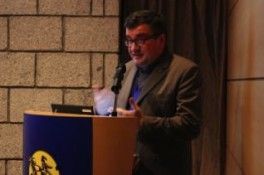 Local residents may be very familiar with the stories and history of Portuguese settlers in Macau. However, there are in fact some other European nations that have left their mark on the city and contributed to its unique culture. A launch ceremony was held last week to introduce two new books that give an account of the lives of Italians in Hong Kong and Macau, as well as the history of the Jesuit’s Far East enterprise.
Local residents may be very familiar with the stories and history of Portuguese settlers in Macau. However, there are in fact some other European nations that have left their mark on the city and contributed to its unique culture. A launch ceremony was held last week to introduce two new books that give an account of the lives of Italians in Hong Kong and Macau, as well as the history of the Jesuit’s Far East enterprise.
Mr Gianni Criveller, whose essay is included in the book “500 Years of Italians in Hong Kong & Macau” (published by the Società Dante Alighieri di Hong Kong under the patronage of the Consulate General of Italy in Hong Kong), discusses the legacies that the Italians and the Jesuits left behind in the city of Macau. He believes that the most important remnant is the Ruins of St Paul’s. “It is an important landmark. It has become, somehow, the symbol of Macau. We are certain that it was built by the Jesuits, and the Italians exercised a role of leadership amongst them.” As far as intangible influences go, the scholar suggested that the Italians and the Jesuits facilitated an environment where people could freely interact with each other; most importantly through the then St Paul’s College. “Macau is one of those cities where people meet without war. If you are aware of the history of Macau, you will know that technically, Macau only became a colony of Portugal in the nineteenth century. Before then it was in fact a Chinese territory on loan to the Portuguese as part of their friendly relationship to allow them to participate in trade and commerce with China. So it was not even a colony in a strict sense like Hong Kong… Macau is a place where people are able to establish communications with China.”
Criveller gave the example of Wu Li, one of the Six Masters of painting in the early Qing period who later became a Jesuit priest. The scholar believes that Wu Li is a good example of how the eastern and western cultures communicated with each other in Macau. “[Wu Li] came and studied in Macau. He also wrote poetry and painted here. So for people like Wu Li, who was a very important scholar and artist, Macau was – at that time – a place of learning, education and formation.”
Criveller pointed out that many Chinese scholars also provided assistance to the missionaries and contributed to their work. “I would like to mention that, without the contribution of his Chinese friends, Matteo Ricci, his disciples and successors could not have achieved what they did… They produced books and maps together…”
Moreover, the fact that this cultural communication was done without any significant altercations shows an outstanding legacy as well. “There is no alternative, I believe, to dialogue and cultural exchange. The only alternatives would be racism, war, oppression and discrimination, all these horrible things that we are still experiencing in this world. The only alternatives are cultural encounters and dialogues. I think that this is probably the most important legacy that we have gained from these people”, said Criveller. JPL
Italian consulate to support academic exchanges
The Consul General of Italy in Hong Kong and Macau, Ms Alessandra Schiavo, who also attended the launch ceremony, told the Times on the sidelines of the event that the Italian population in Macau has grown by 55 percent to 199 people since 2010. She hopes to help her compatriots understand the importance of Macau as a place where the east and the west meet, as well as facilitating more cultural and academic exchanges between Macau and Italy. Schiavo pointed out that there is also an increasing amount of Italian scholars coming to Macau. She revealed that the Consulate is planning to establish a scholarship to attract Macau students to study in Italy as well. “We would love to see more Macau students going to study in Italy. I am actually trying to create a small fund to promote this. The first part of the fund will go towards scholarships for Macau students to go to Italy. Basically what they need to apply for a scholarship are ideas for collaboration projects between Macau and Italian universities.” The Consul suggested that universities on both sides sign agreements regarding student exchanges, and called on them to be the ones that take the initiative to create this sort of cooperation. JPL
